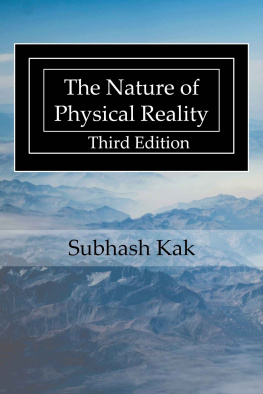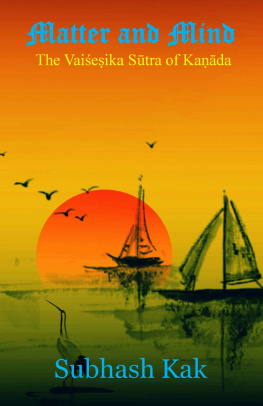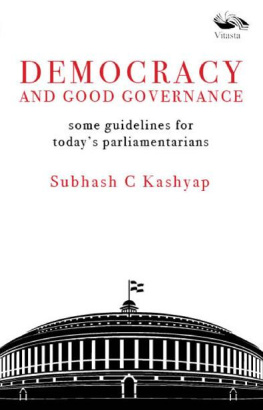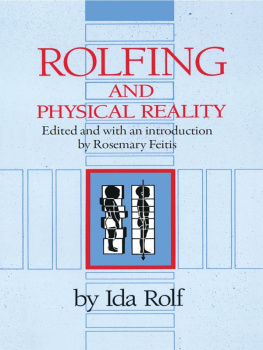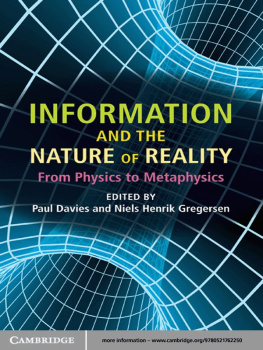Subhash Kak - The Nature of Physical Reality
Here you can read online Subhash Kak - The Nature of Physical Reality full text of the book (entire story) in english for free. Download pdf and epub, get meaning, cover and reviews about this ebook. year: 2016, publisher: Mount Meru Publishing, genre: Religion. Description of the work, (preface) as well as reviews are available. Best literature library LitArk.com created for fans of good reading and offers a wide selection of genres:
Romance novel
Science fiction
Adventure
Detective
Science
History
Home and family
Prose
Art
Politics
Computer
Non-fiction
Religion
Business
Children
Humor
Choose a favorite category and find really read worthwhile books. Enjoy immersion in the world of imagination, feel the emotions of the characters or learn something new for yourself, make an fascinating discovery.
- Book:The Nature of Physical Reality
- Author:
- Publisher:Mount Meru Publishing
- Genre:
- Year:2016
- Rating:3 / 5
- Favourites:Add to favourites
- Your mark:
- 60
- 1
- 2
- 3
- 4
- 5
The Nature of Physical Reality: summary, description and annotation
We offer to read an annotation, description, summary or preface (depends on what the author of the book "The Nature of Physical Reality" wrote himself). If you haven't found the necessary information about the book — write in the comments, we will try to find it.
The Nature of Physical Reality — read online for free the complete book (whole text) full work
Below is the text of the book, divided by pages. System saving the place of the last page read, allows you to conveniently read the book "The Nature of Physical Reality" online for free, without having to search again every time where you left off. Put a bookmark, and you can go to the page where you finished reading at any time.
Font size:
Interval:
Bookmark:
The Nature of Physical Reality
Also by SUBHASH KAK
The Architecture of Knowledge
The Astronomical Code of the gveda
The Gods Within
Mind and Self
The Praj Stra: Aphorisms of Intuition
The Wishing Tree
In Search of the Cradle of Civilization
The Avamedha
The Nature of Physical Reality
(Third Edition)
Subhash Kak
Mount Meru Publishing
Copyright 2016 by Subhash Kak
All rights reserved. No part of this book may be reproduced or transmitted in any form or by any means, electronic or mechanical, including copying, photocopying, scanning, and recording or by any information storage and retrieval system without written permission from the author, except for material already in public domain or for the inclusion of brief quotations for research or review.
________________________________________________
Library and Archives Canada Cataloguing in Publication
Kak, Subhash, 1947-, author
The nature of physical reality / Subhash Kak. Third edition.
Includes bibliographical references and index.
Issued in print and electronic formats.
ISBN 978-1-988207-07-0 (paperback).--ISBN 978-1-988207-08-7 (html)
- Physics--Philosophy. 2. Paradox. 3. Reality. I. Title.
QC6 K24 2016 530.01 C2016-901986-1
________________________________________________________________
The views expressed in this book belong solely to the author and do not necessarily reflect the views of the publisher. Neither the author nor publisher is liable for any loss or damages resulting from the use of information presented in this book. Neither the author nor publisher makes any representation or warranty with respect to the accuracy or completeness of the information presented in this book.
Published in 2016 by:
Mount Meru publishing
P.O. Box 30026
Cityside Postal Outlet PO
Mississauga, Ontario
Canada L4Z 0B6
Email: mountmerupublishing@gmail.com
ISBN 978-1-988207-08-7
To Naumi
CONTENTS
PREFACE
I am pleased that the third edition of The Nature of Physical Reality is being published. The premise of the book that rational models have limited capacity to explain reality has been validated by the developments of the past two decades. Logical paradoxes plague mathematics and physics, and the promise of a unified theory of physics has not been fulfilled. It is still not possible to reconcile quantum theory with gravitation and string theory has no predictive capacity.
Science is unable to explain why life comes with freedom and intentionality when the inanimate world is governed by physical law. But this does not mean that science is not making progress. There is a hidden order in physical reality that transcends the capacity of rational models and slowly science is providing indirect evidence on the nature of this order. This process has the potential to illuminate the mystery of consciousness. This edition has an epilogue that brings the story up to date and shows how the hidden order could be ascertained by scientific argument and experimentation.
Subhash Kak
Stillwater, Oklahoma
March 9, 2016
INTRODUCTION
This book was written with two objectives in mind: to present a summary of the current scientific understanding of the physical world, and to show that man's questioning across the ages has had continuity in terms of preoccupation with paradoxes. Science makes it possible for us to see the unity that lies underneath seemingly unrelated phenomena. This unification does not always resolve difficulties related to interpretation and meaning. Each advance in science resolves paradoxes at one level, but only at the cost of new paradoxes that appear at other levels.
The word paradox comes from Latin paradoxum or Greek paradoxos , literally contrary to opinion, and it may mean a statement that appears self-contradictory. A Sanskrit cognate is paroka (antonym of pratyaka , clear to the eye) which has the meaning of being apparently contradictory but leading to a deeper understanding of the subject. There are many paradoxes at the levels of the individual self and the cosmos.
The gveda, perhaps man's earliest extant composition that is dated variously from 3000 to 1500 BC, articulates the problem of paradox and reality. According to it, rational science can describe the material world but not consciousness. The phenomenal world is characterized by duality but at a deeper transcendent level the universe has a unity. The paradoxes of the gveda concern time, space, agency and language. These paradoxes are to awaken the reader from a sense of certain knowledge so that he can obtain a deeper understanding of reality.
The Upaniads, which explain the philosophical problems of the gveda, claim that there are two kinds of knowledge: the lower, and the higher. The lower knowledge concerns material things whereas the higher knowledge is about the experiencing self. The Upaniads deal with the paradox that inert matter transformed into living form becomes capable of self-awareness and of free-will. They suggest that certain contradictions can only be resolved through intuition and not by reason. To point out the limitations of rational knowledge, the Kena Upaniad says: He who thinks he knows it not, knows it. He who thinks he knows it, knows it not. The true knowers think they can never know it, while the ignorant think they know it.
The atomic school of Kada points out the paradox of divisibility: If matter consists of atoms, each atom must be point-like because otherwise it would be further divisible. The enlargement of point-like atoms to gross matter with size is another paradox.
Zeno, in ancient Greece, argued that space is neither continuous nor discontinuous. If space is continuous, Achilles, the fleetest warrior, can never win a footrace against a tortoise who starts ahead. It will take him time to reduce the distance to half in which duration the tortoise would have moved further ahead and this will go on ad infinitum. If space is discontinuous, an arrow cannot move because it is either at one point or the next and there is nothing between.
The modern resolution of this paradox is that while space is continuous, Achilles overtakes the tortoise because the infinite series representing the time taken by him has a finite sum. But this raises the question: What is infinity? A hundred years ago, Cantor presented a set-theoretic approach to infinity in which points in a small line can be put into a one-to-one correspondence with the points in a longer line or in a solid. Some mathematicians reject the idea of Cantor's infinite sets, and believe that the only mental constructions permitted should be the ones that are intuitively reasonable. Thus the idea of a potential infinity is reasonable, but not that of an object with an infinite number of members as in Cantor's sets.
Aristotle discussed the liar paradox. Is the statement I am lying true or false? If the man is lying, he is speaking the truth, and if he is speaking the truth, he is lying. In the 1930s Gdel showed that for mathematical systems of sufficient complexity there exist propositions that can be neither proved nor disproved. This implies a denial of the law of excluded middle, which is a basic axiom of logic.
The cosmic edge riddle of the ancients was: What happens to the spear when it is hurled across the outer boundary of the universe? This riddle points to a difficulty in viewing the universe as a whole. One modern version of this riddle, when we consider the time boundary or the beginning of the universe, is: Are the laws of nature the same now as they were at the big bang? Another version: What existed before the big bang?
The paradox of consciousness is not addressed by any discipline of science. If natural laws govern the evolution of the universe, then the behavior of human beings should be completely pre-determined. But human beings do make choices. Is the person visualizing the universe a part in an endless loop?
Font size:
Interval:
Bookmark:
Similar books «The Nature of Physical Reality»
Look at similar books to The Nature of Physical Reality. We have selected literature similar in name and meaning in the hope of providing readers with more options to find new, interesting, not yet read works.
Discussion, reviews of the book The Nature of Physical Reality and just readers' own opinions. Leave your comments, write what you think about the work, its meaning or the main characters. Specify what exactly you liked and what you didn't like, and why you think so.

